by Riley Robinson ’25
I first discovered the Überseestadt late in February, during one of the long rainy nights typical to Bremen in that season. Having gotten bored of studying for language class, I decided to take advantage of the tepid and breezy night by going for a local exploration expedition. I decided it was also the perfect time to try one of the Lime E-Scooters I had been enviously watching people zip around on throughout the city. After a few minutes of riding around my neighborhood, I made a quick turn and crossed some railroad tracks, down a path I hadn’t seen before. It didn’t take long before I spilled out onto a main road, which I would later learn to be part of the Überseestadt. I spent the next hour weaving through the undeviating streets of the district, realizing that this was an entire area of the city I had little idea about sitting right in my backyard.
The Überseestadt is a ‘Port-Revitalization’ project by Bremen. Formerly a massive dockyard and railway hub, the area has since been rehauled and turned into a living and working district. Alongside the many modern condominiums are large commercial buildings that make up their own skyline. On the southern end, near Eduard-Schopf-Allee, is the Weser Tower. It is the tallest building in Bremen and is visible from most points on the South-western side of the city.
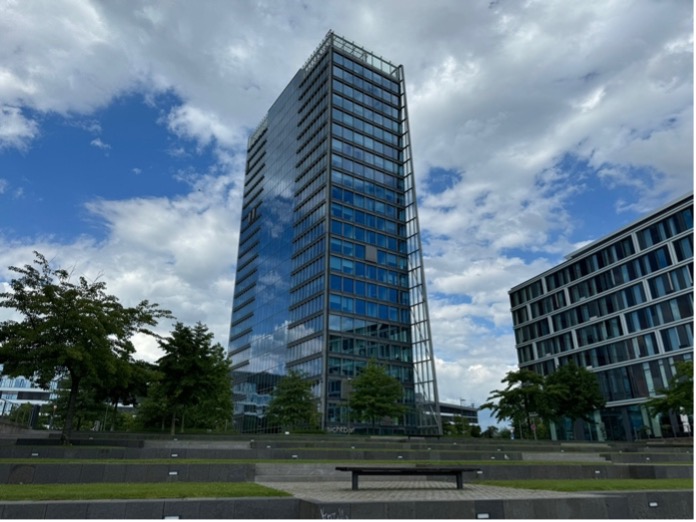
The Weser Tower. Below is a multi-level pavilion, where people take time off their workday to view the river, and local rappers sometimes come to shoot their music videos.
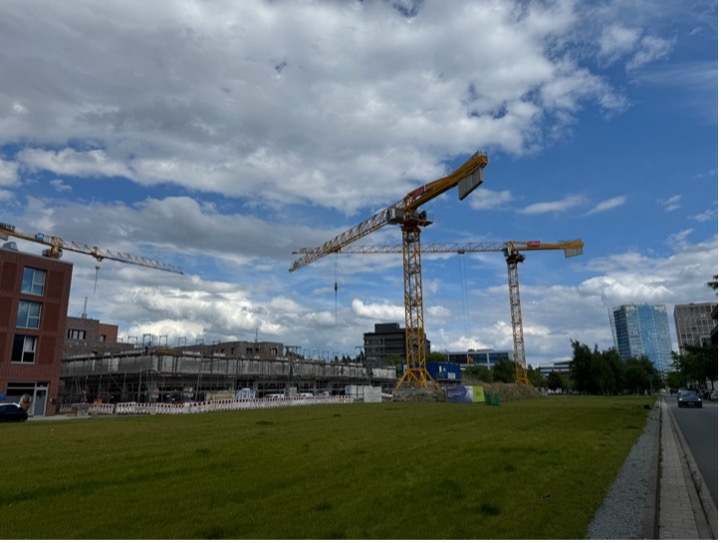
An example of the many development projects in the Überseestadt. This is construction of the Kaffee Quartier, a new residential block.
Europahafen is a central piece to the Überseestadt. It is easily accessible from the tram stops Europahafen and Konsul Smitdt Straße, serviced by the 3 and 5 lines. Once an old dock for commercial shipping, it now houses private boats, and is lined with premium condos and office buildings. On the ground floor of many, you can find restaurants, cafes, and bars to sit at and enjoy the peacefulness of the harbor. My favorite part of this area is the “Überseestadt Shack”. This is a little shipping container that has been outfitted with a bar inside and deck chairs on the top for viewing of the harbor. On Sundays they open, and you can buy beer and other drinks inside. It’s a great place to relax and enjoy a sunny day or warm night.
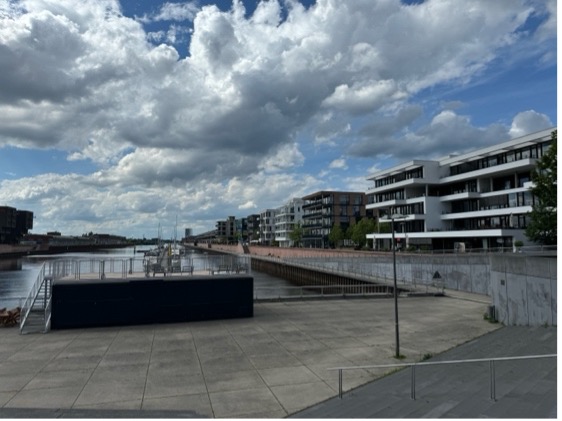
The Überseestadt Shack at Europahafen
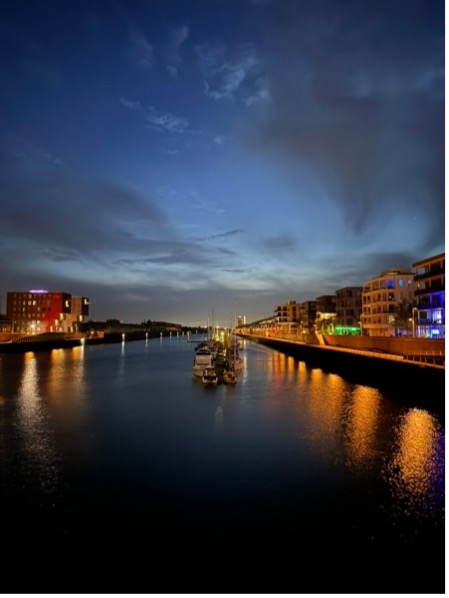
A summer night’s view from the top of the shack.
Further down the promenade, there is a great restaurant for Flammkuchen.
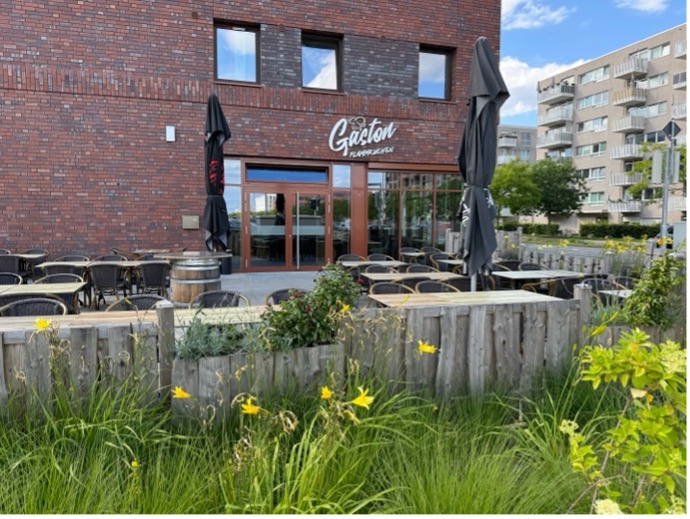
The Flammkuchen Restaurant.
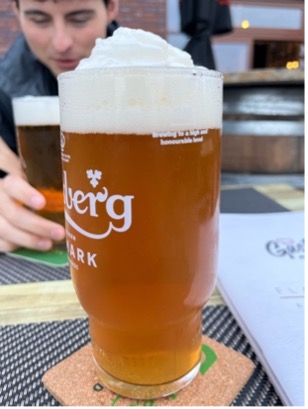
An honorable pour.
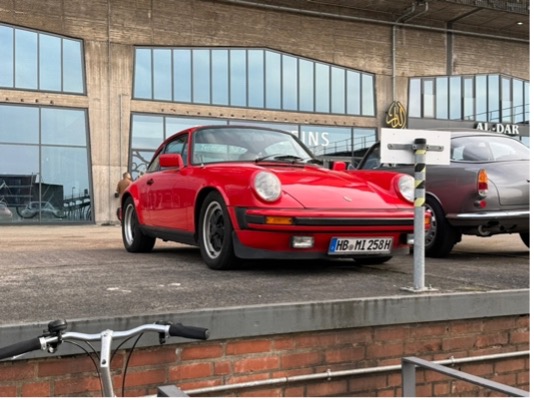
Spotted outside of the Automotive Museum.
They also serve some amazing beer. It has a nice area to sit outside, although very close to a busy road. It’s located right across the lot from the Automotive Museum, which is worth checking out if you are into historical German cars.
The Überseestadt is also home to the University of the Arts, located in a former warehouse on Eduard-Suling-Straße.
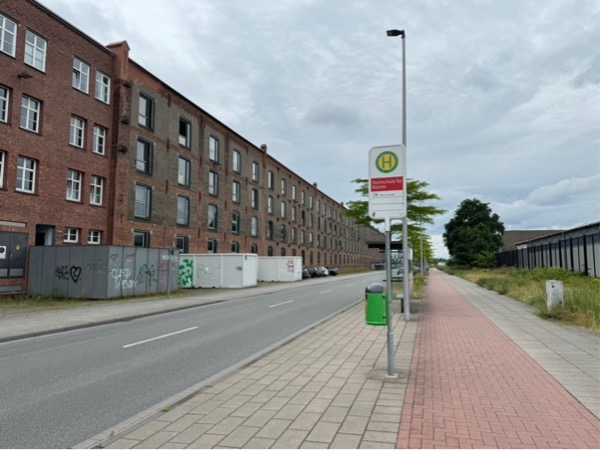
The University of the Arts.
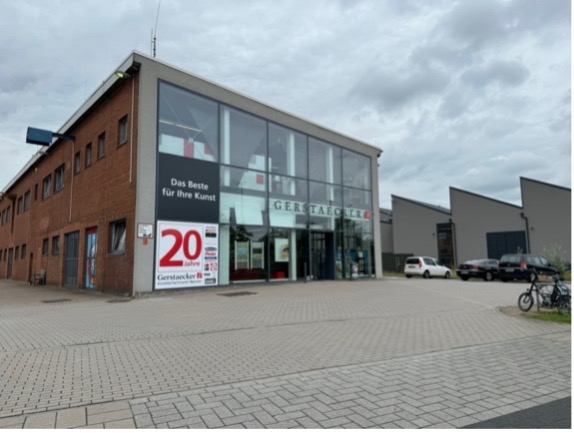
The Art Store.
Appropriately, an art supply store is near the University. If you like to paint, draw, or do anything that may require art supplies, I recommend checking this place out. It blends an industrial, open style layout with a friendly and familiar vibe. Walk around the area, and you may discover some interesting hide-out spots to relax or to get some work done.
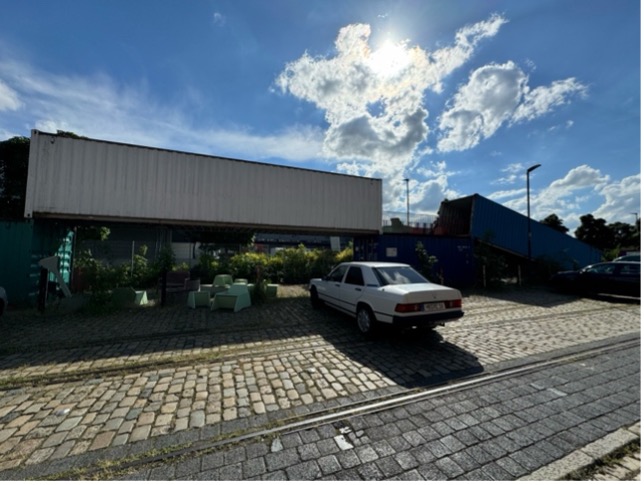
One of the many chill nooks in the area. On the bottom, a few couches, and chairs. Walk through the shipping container propped up, and you can also recline on the deck chairs on top.
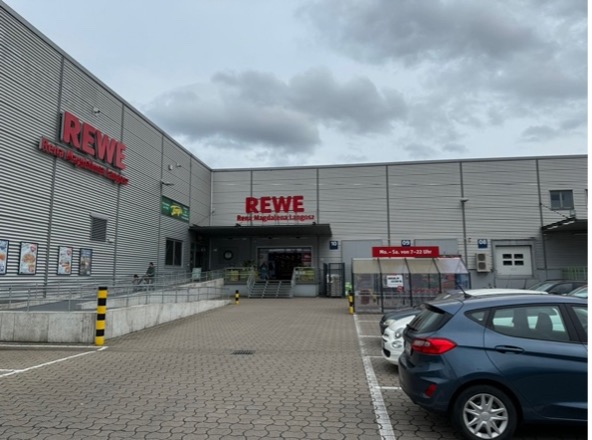
The REWE. Accessible by the bus line 28 at the Winterhafen stop.
Adventure further into the Überseestadt, and you will find a REWE and a large urban park. The district has two main grocery stores, an Aldi at Europahafen and the REWE at Winterhafen. As someone whose grocery shopping experience is affected heavily by aesthetics, the REWE at Winterhafen was a welcome sight when I first discovered it. Large ceilings, nice lighting, and a good selection of food are part of the deal here. It also features a bakery, and a Pfand machine, the closest one to my home. I have many great memories of performing superhuman balancing acts trying to bike home from this REWE with a bag of groceries and/or plastic bottles needing to be redeemed.
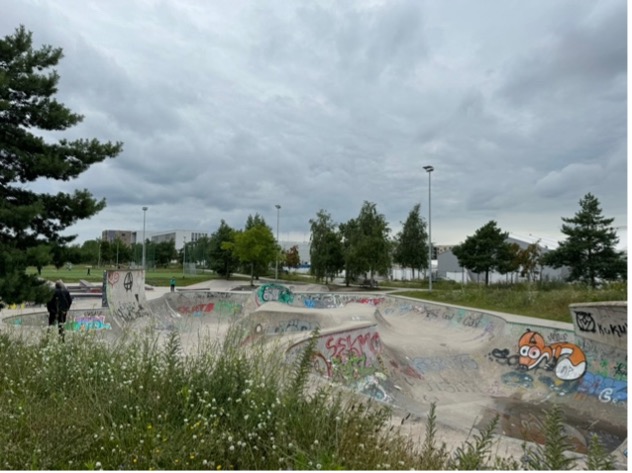
The skatepark at the Überseepark.
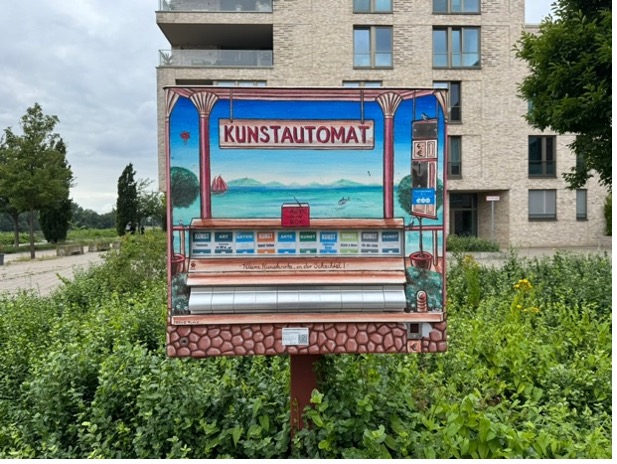
An Art vending machine near the park. Pay four euros, choose a piece. There are many options, including regional art and themed works. Great for a tiny keepsake.
Across from REWE, the Überseepark spans horizontally across multiple blocks. It is constantly teeming with young people, usually running football matches on the turf, playing basketball, using the skatepark or the parkour gym. One fun fact about this place: it was designed by about 400 elementary school aged kids, using an online forum. Their input and ideas were prioritized when considering the layout of the park.
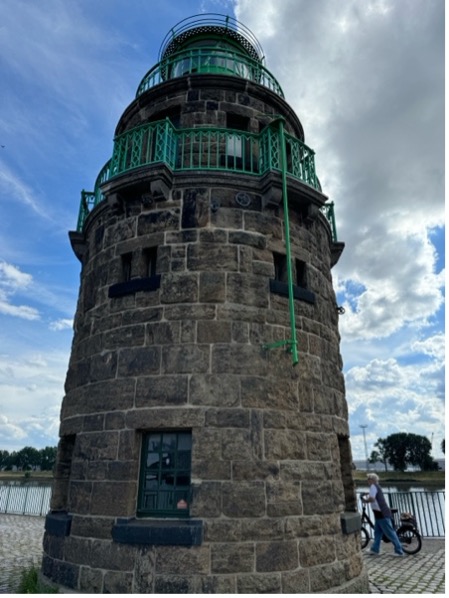
The Lighthouse.
At the northern tip of the Überseestadt, there is the Waller Sand, a signature aspect of the district. The Waller Sand is an artificial beach, signifying the end of the Überseestadt. While you can’t go swimming, it offers a fantastic view of the still functioning Bremen harbor. It requires a bit of a journey; however, it’s worth doing, especially in the evening hours, where you can walk along the promenade and soak in the cool river breeze while listening to some music and taking in the elongated northern German sunset. The area is surrounded by residential buildings, and many people come to chill and enjoy the view, although the crowds are never disruptive.
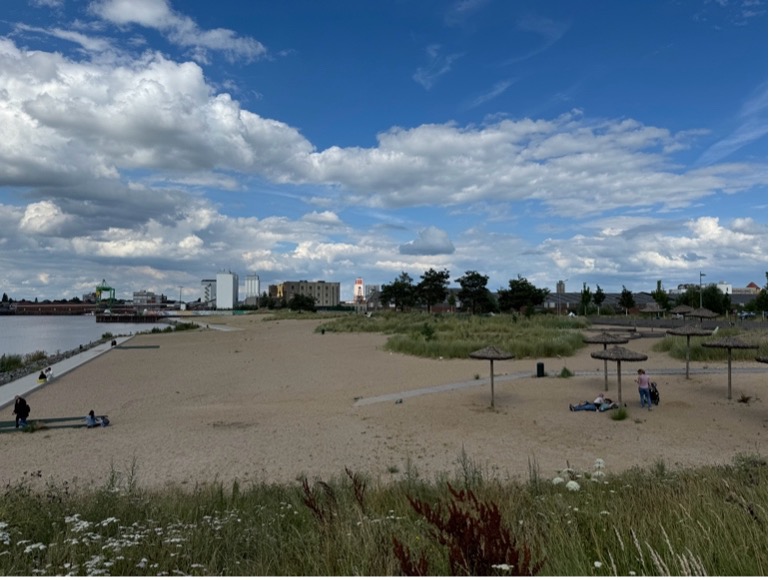
The Waller Sand.
Yesterday, I went up and did this exact thing, and witnessed a marriage proposal on the beach. The guy clearly went all out, with a heart-shaped trellis holding up a neon sign with the words, as well as sprinklers and drones. Congrats! Additionally, there is a lighthouse at the north-most tip, and you can walk down a trail to access it.
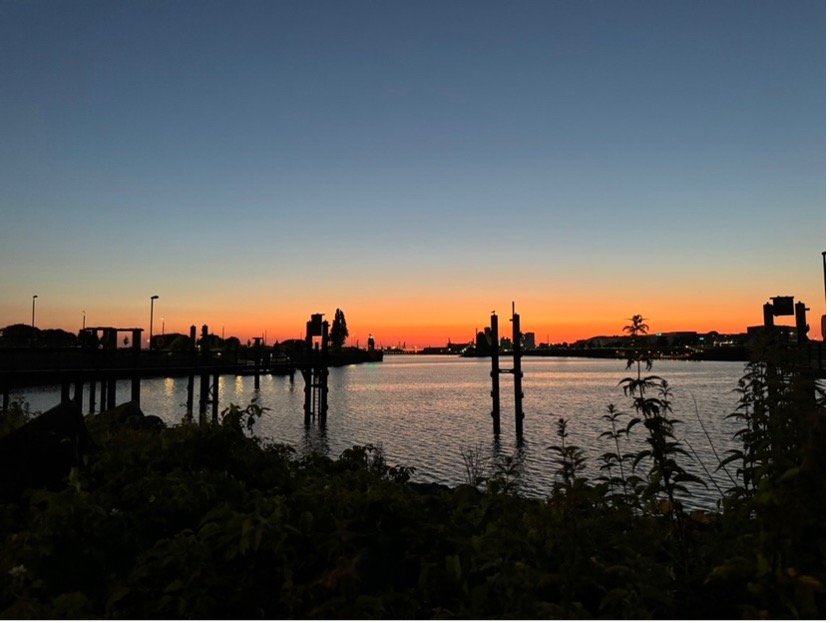
A sunset view over the harbor. Who said Bremen isn’t paradise?
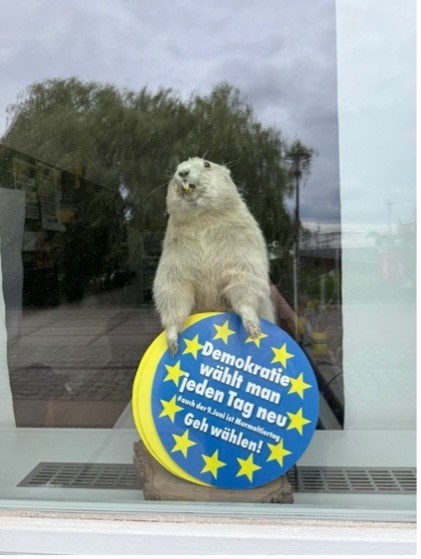
The Groundhog Democracy Advocate.
Due to the atypical housing arrangement of this spring semester, I was able to live in an area of the city not frequented by members of Dickinson in Bremen. The Überseestadt is a very new and relatively obscure part of the city, and I’ve been grateful to experience living in this area for the past six months. Because of how new the Überseestadt is, it can feel artificial, and a lot of the architecture lacks character for this reason. However, the potential for its growth as a vibrant part of Bremen is noticeable, and the rate of development makes me interested in seeing how it will progress after a few more years. Even if you are living close to the University, I recommend going out of your way to check out the Überseestadt and explore for yourself the many quirky and unique locations of this area.
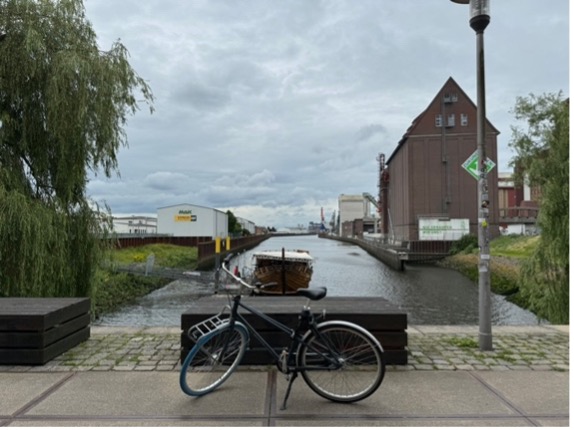
My bike* near the Waller Ring entrance to the Überseestadt. To the right, there is a factory still active that is serviced by a train every day. The district is still intertwined with the many port-serviced industries of Bremen.
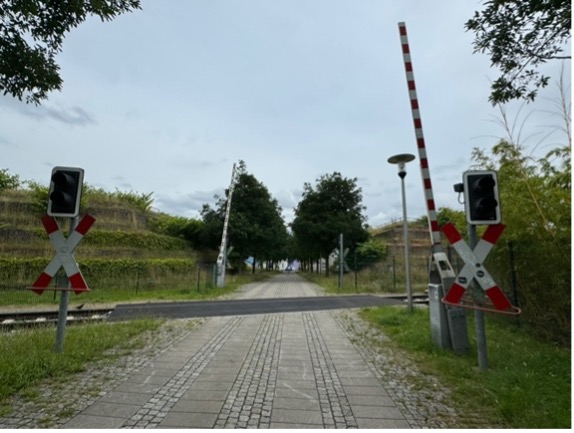
The entrance to my neighborhood. This path connects it with the greater Überseestadt. Shoutout to Eintrachtstraße.
*I began renting this bike from the beginning of May. It’s a fantastic way to get around, and a great option if you ever get bored of taking public transportation, especially in the warmer months. Having your own bike and riding around the city almost feels like it should be part of the integration test. You will feel like a local, and you get to see areas of the city that aren’t visible otherwise. Tons of bike paths, and it shrinks the city when you own one. Also great for getting back from bars and clubs after 1:30, when the tram shuts down. I highly recommend Swapfiets, the bike rental company. For 6 months, you pay 17 euros a month for this bike. I use the flexible rental, so I pay 24 euros each month to be able to cancel at any time. They take care of all services for you.

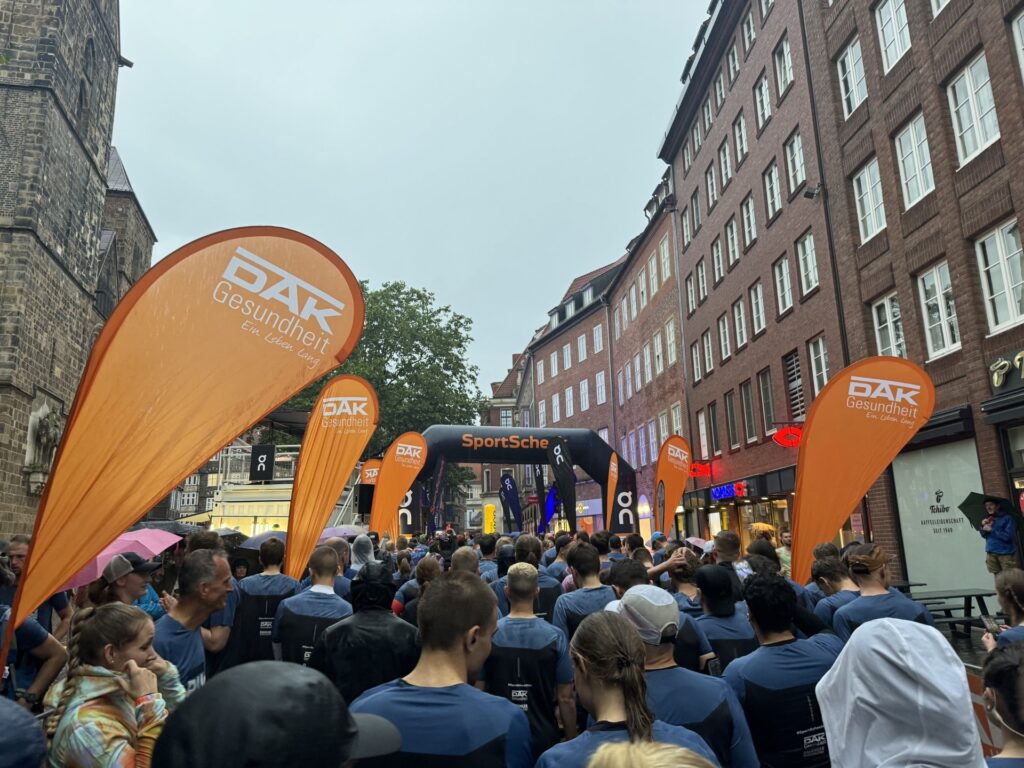
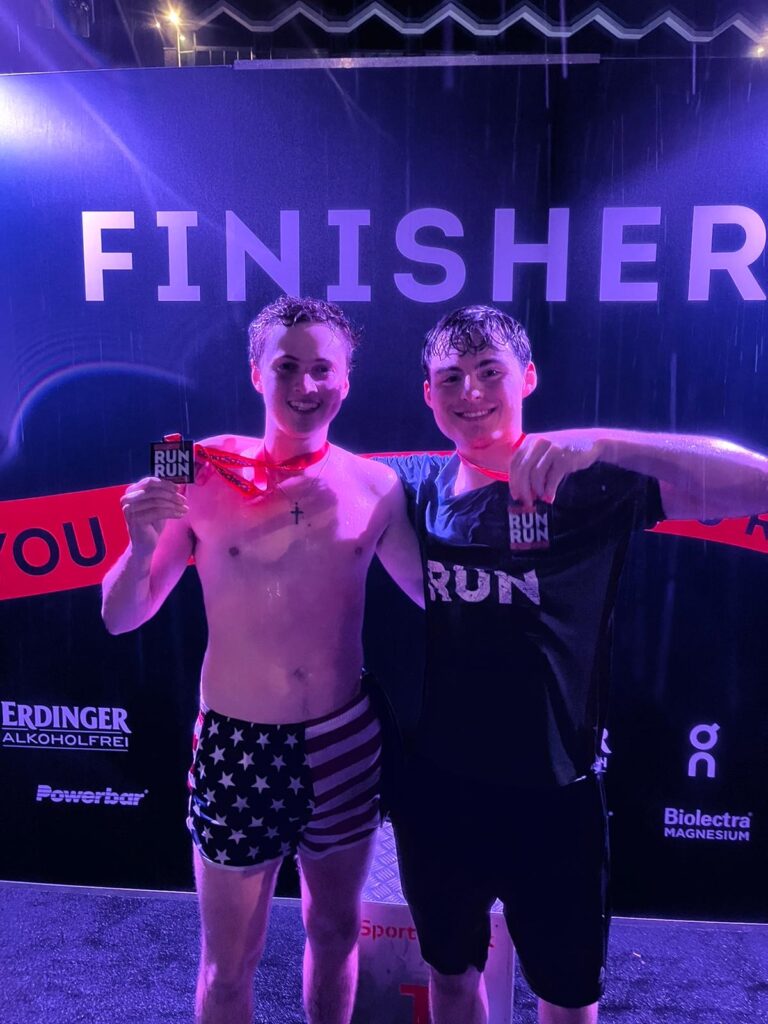
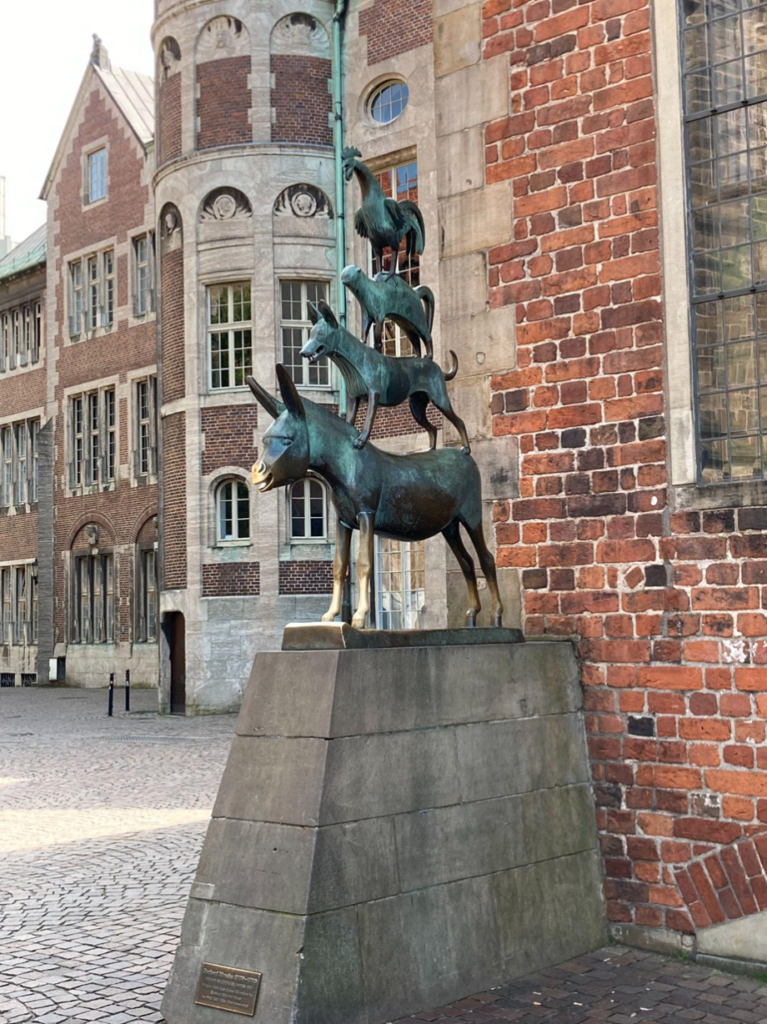
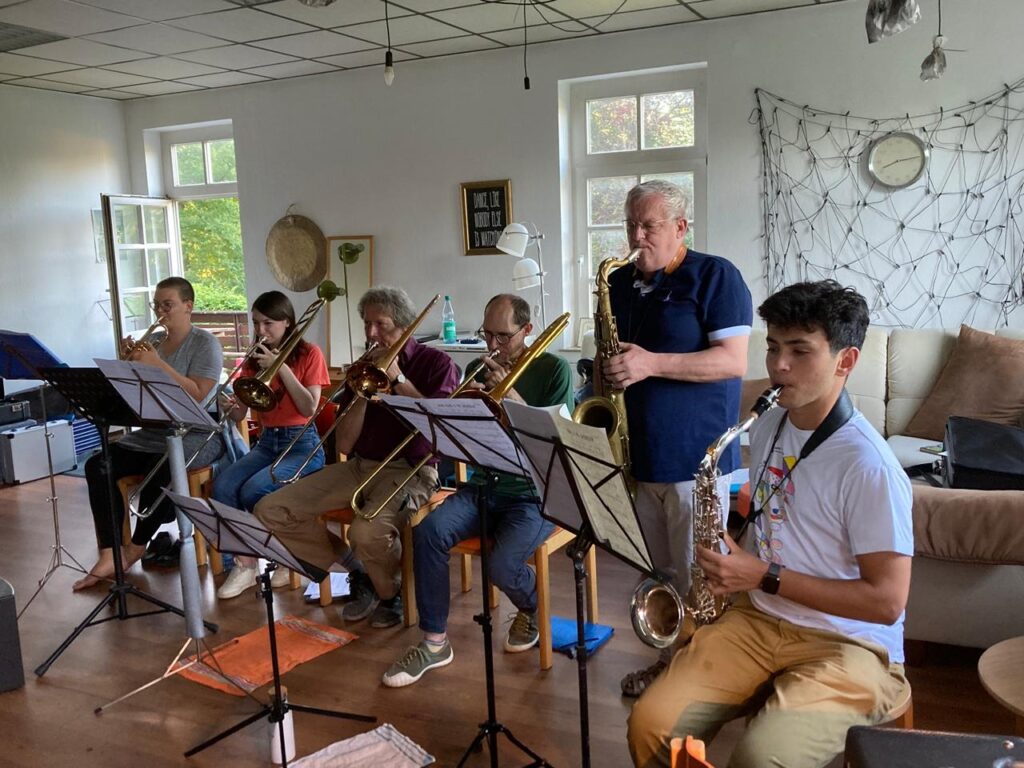
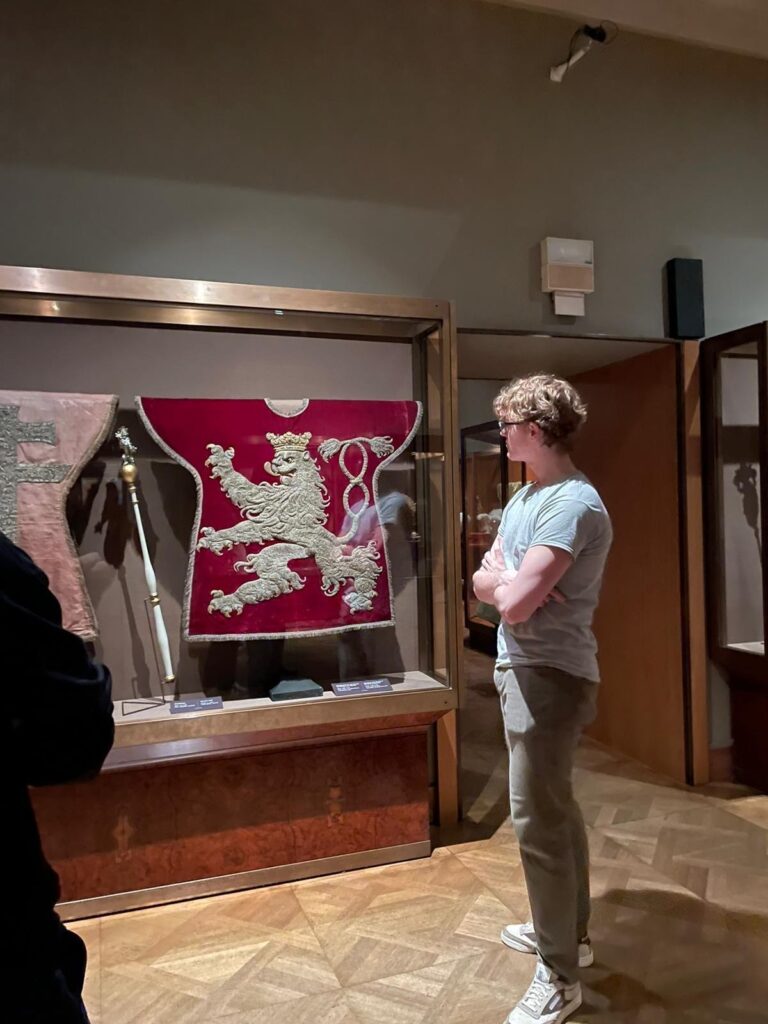
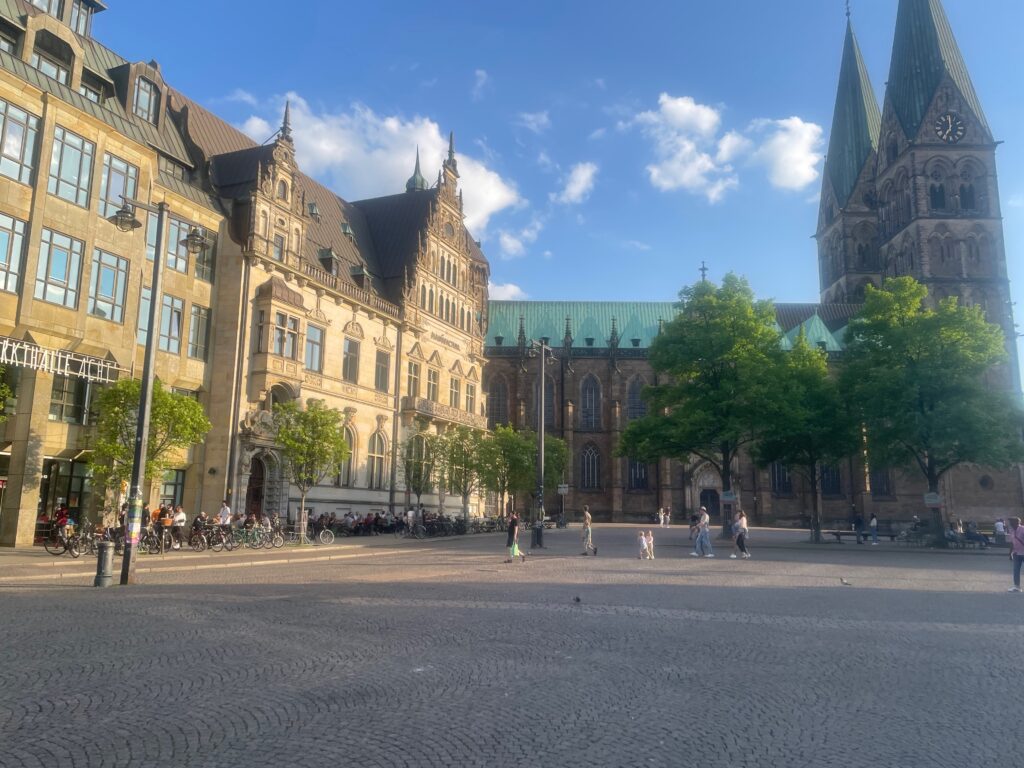
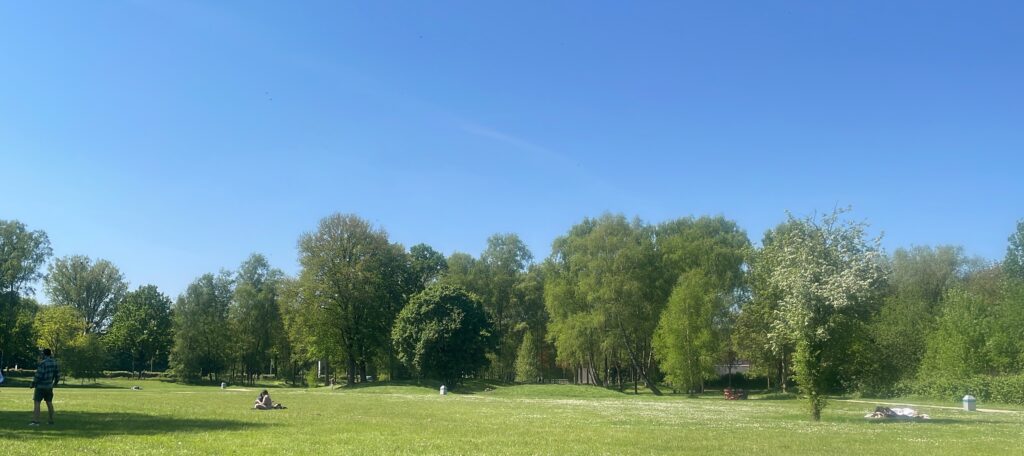
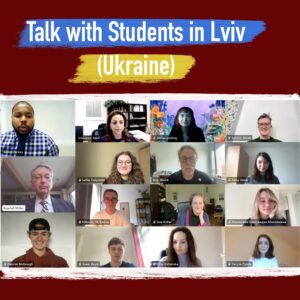
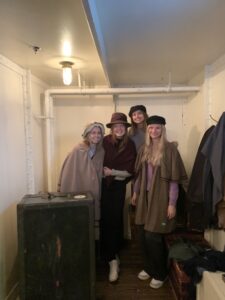
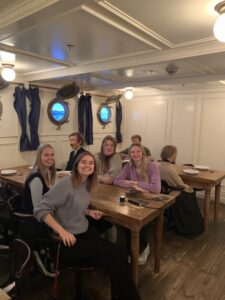
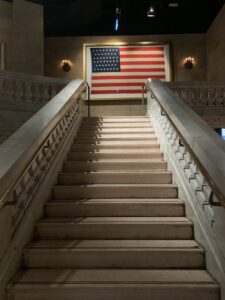
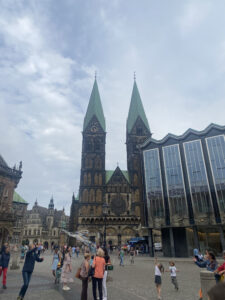 When I was picking which college to go to my senior year of high school, I knew studying abroad was a huge factor in my decision. Ultimately, I landed on Dickinson, which has great study abroad programs all over the world. Before I started school, I went to Germany in 2019 with my host family and fell in love with the country. After I returned to the U.S., I knew I wanted to come back. When I found out Dickinson had a program in Germany, I was ecstatic and had a feeling that when Junior spring came around, I would be back in the country that I grew to love.
When I was picking which college to go to my senior year of high school, I knew studying abroad was a huge factor in my decision. Ultimately, I landed on Dickinson, which has great study abroad programs all over the world. Before I started school, I went to Germany in 2019 with my host family and fell in love with the country. After I returned to the U.S., I knew I wanted to come back. When I found out Dickinson had a program in Germany, I was ecstatic and had a feeling that when Junior spring came around, I would be back in the country that I grew to love.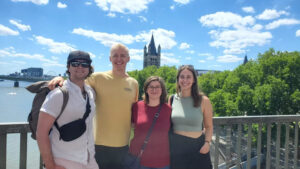 both Aristoles and Goethe Institute learning the language. This was because almost all of our classes at the University of Bremen were in German. After becoming proficient in German, we began our classes. Three of my classes were business related and one was Political Science related. They were all super interesting and gave me a different perspective on how higher education is in Germany and different viewpoints. All in all, I had a great learning experience in Germany.
both Aristoles and Goethe Institute learning the language. This was because almost all of our classes at the University of Bremen were in German. After becoming proficient in German, we began our classes. Three of my classes were business related and one was Political Science related. They were all super interesting and gave me a different perspective on how higher education is in Germany and different viewpoints. All in all, I had a great learning experience in Germany.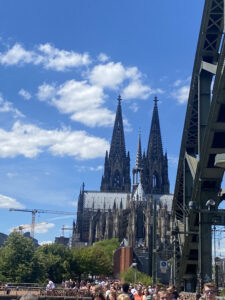 Lastly, learning about the culture and trying new foods was a highlight. Having Doner Kebab, Wiener Schnitzel, and Wurst was awesome. Everything was delicious! Trying different things, playing new games, and experiencing the culture from a first-hand experience were amazing. The Dickinson in Germany study abroad experience is one I will never forget. I was able to try so many different things and get to meet and see so many friends! I liked it so much, that I am currently applying for a Fulbright Grant to be an English Teaching Assistant in Germany. I can’t wait to come back to visit. Till next time Germany!
Lastly, learning about the culture and trying new foods was a highlight. Having Doner Kebab, Wiener Schnitzel, and Wurst was awesome. Everything was delicious! Trying different things, playing new games, and experiencing the culture from a first-hand experience were amazing. The Dickinson in Germany study abroad experience is one I will never forget. I was able to try so many different things and get to meet and see so many friends! I liked it so much, that I am currently applying for a Fulbright Grant to be an English Teaching Assistant in Germany. I can’t wait to come back to visit. Till next time Germany!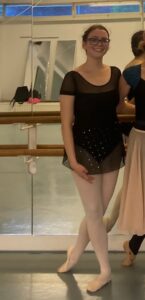 students to take for a relatively low price. Dickinson will also reimburse you up to a certain amount to take these courses. You can see a list of past/current course offerings on their
students to take for a relatively low price. Dickinson will also reimburse you up to a certain amount to take these courses. You can see a list of past/current course offerings on their